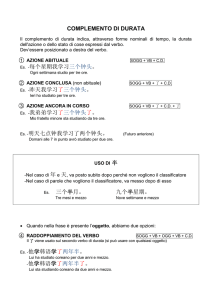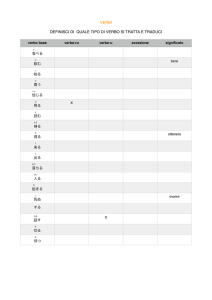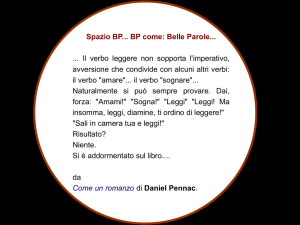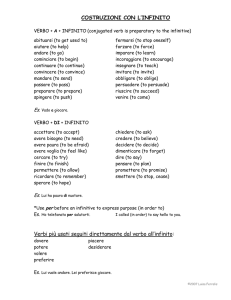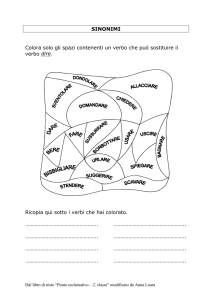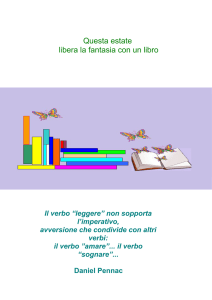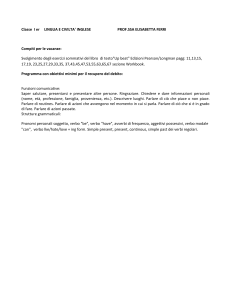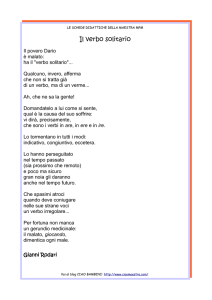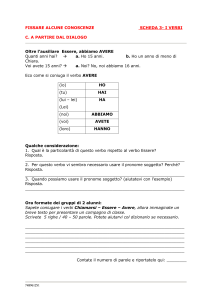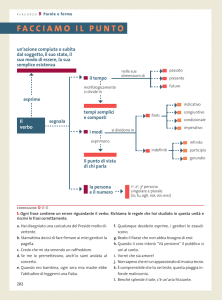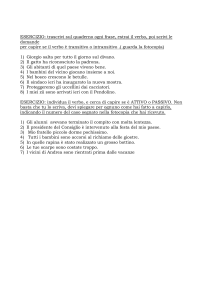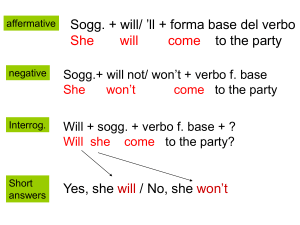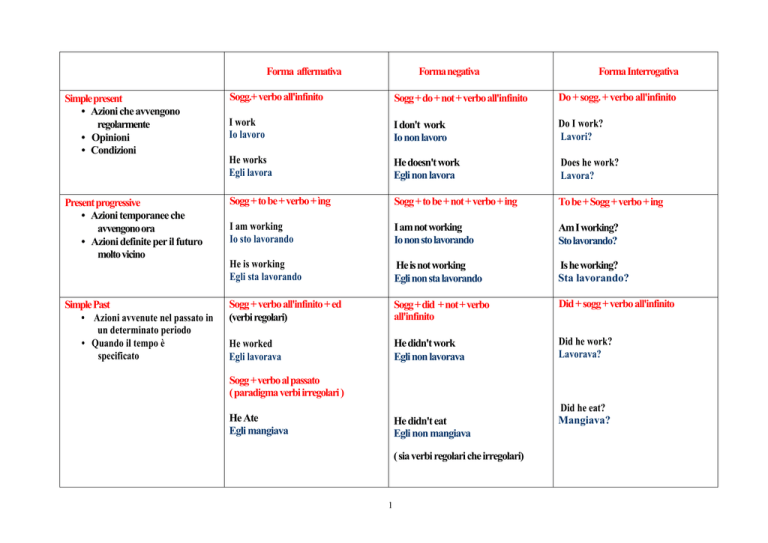
Forma affermativa
Simple present
• Azioni che avvengono
regolarmente
• Opinioni
• Condizioni
Present progressive
• Azioni temporanee che
avvengono ora
• Azioni definite per il futuro
molto vicino
Simple Past
• Azioni avvenute nel passato in
un determinato periodo
• Quando il tempo è
specificato
Forma negativa
Forma Interrogativa
Sogg.+ verbo all'infinito
Sogg + do + not + verbo all'infinito
Do + sogg. + verbo all'infinito
I work
Io lavoro
I don't work
Io non lavoro
Do I work?
Lavori?
He works
Egli lavora
He doesn't work
Egli non lavora
Does he work?
Lavora?
Sogg + to be + verbo + ìng
Sogg + to be + not + verbo + ing
To be + Sogg + verbo + ing
I am working
Io sto lavorando
I am not working
Io non sto lavorando
Am I working?
Sto lavorando?
He is working
Egli sta lavorando
He is not working
Egli non sta lavorando
Is he working?
Sta lavorando?
Sogg + verbo all'infinito + ed
(verbi regolari)
Sogg + did + not + verbo
all'infinito
Did + sogg + verbo all'infinito
He worked
Egli lavorava
He didn't work
Egli non lavorava
Did he work?
Lavorava?
Sogg + verbo al passato
( paradigma verbi irregolari )
He Ate
Egli mangiava
He didn't eat
Egli non mangiava
( sia verbi regolari che irregolari)
1
Did he eat?
Mangiava?
Past progressive
• Azioni avvenute nel passato ma
che non sono ancora concluse
Sogg + pass to be + verbo + ing
Sogg + pass to be + not + verbo ing
Pass to be + sogg + verbo + ing
He was working
Stava lavorando
He wasn't working
Egli non stava lavorando
Was he working?
Stava lavorando?
Past perfect tense
Sogg + Had + verbo + ed
( participio passato)
Sogg + had + not + verbo +ed
( participio passato)
Had + sogg + verbo + ed
( participio passato )
I had worked
Io avevo lavorato
I had not worked
Io non avevo lavorato
Had I worked?
Avevo lavorato?
( verbi regolari)
(verbi regolari)
I had Eaten
Io avevo mangiato
I had not eaten
Io non avevo mangiato
(verbi irregolari)
Had I eaten?
Avevo mangiato?
Sogg + will + not + verbo all'infinito
Will + sogg + verbo all'infinito
I will not drink
Will I drink?
I won't drink
Berrò?
(trapassato prossimo)
• Quando si mettono in relazione
due
azioni avvenute nel passato
( verbi irregolari)
Sogg + will + verbo all'infinito
Futuro Semplice
• Si usa per azioni generiche
• Azioni non programmate
I will drink
decise nel momento in cui si
parla
I'll drink
• Azioni future certe che non
dipendono dalla nostra volontà
Io berrò
Io non berrò
• Previsioni, promesse, quando
ci si offre nel fare qualche
cosa
2
Futuro intenzionale
• Avere intenzione di
compiere un'azione
• Stare per fare un'azione o per
accadere
Condizionale presente
Sogg + TO BE GOING TO + verbo
all'infinito
Sogg + to be + not + going to + verbo
all'infinito
To be + sogg + going to + verbo
all'infinito
I am going to drink a coffee
I am not going to drink a coffee
Am I going to drink a coffee?
Io berro’ un caffè
Io non berrò un caffè
Berrò un caffee?
Sogg + would + verbo all'infinito
Sogg + would + not + verbo
all'infinito
Would + sogg è verbo all'infinito
I would work
Io lavorerei
I would not work
Io non lavorerei
Would I work?
Lavorerei?
I wouldn't drink
Condizionale passato
Sogg+ would + have + participio
passato del verbo
Sogg +would + not+ participio
passato del verbo
Would +sogg+Have + Participio
passato del verbo
I would have worked
Io avrei lavorato
I would not bave worked
Io non avrei lavorato
Would I have worked?
Avrei lavorato?
I wouldn't have worked
3
Proposizione con If
If clauses l°tipo
• Situazioni reali
• Eventi possibili
• Avvertimenti
• Minacce
If clauses 2°tipo
• Cose improbabili
• Situazioni immaginarie
• Situazioni non reali
If clauses 3° tipo
• Ipotesi di cose accadute in passato
• Situazioni non reali al presente o al futuro
• Crìtiche o rimpianti
Proposizione principale
If + sogg + Simple present
Sogg + Futuro semplice + verbo all'infinito
If you study hard,
Se studi molto
You will pass the test
Tu passerai l’esame
If + sogg + Past Simple
Sogg + Would + verbo all'infinito
If I had a million dollars,
Se avessi un milione di dollari,
I would buy a big house
comprerei una casa grande
If + sogg + Past perfect
Sogg + Would + have + verbo participio passato
If you had asked me,
Se tu mi avessi chiesto
I would have come with you
Io sarei venuto con te
4
CAN
Sapere ( fare qualche cosa)
I can swim
So nuotare
( io posso nuotare perché so farlo)
Potere
(Quando la possibilità di compiere
un’azione dipende dal soggetto)
My father can came tomorrow
Mio padre può venire domani
( mio padre ha la possibilità di venire
domani)
I can pass the exam
Posso passare l’esame
( ho la possibilità di passare l’esame)
Potere
(Quando si chiede il permesso di fare
un’azione)
Can I take the car?
Posso prendere la macchina?
(posso chiedere il permesso di prendere la
macchina?)
Verbi di percezione
Can I see him?
Lo vedo
( posso vederlo)
5
Simple present
Simple past
( potevo – potei – ho potuto )
Condizionale presente
( potrei )
Condizionale imperfetto
(potessi)
Tempi mancanti
Futuro
Past perfect
Can - Can’t - Cannot
Could - could not – couldn’t
Could - could not – couldn’t
I can swim
Posso nuotare
( so nuotare)
She could walk when she was 10 month
Sapeva ( poteva) camminare quando aveva
10 mesi
You could pass the exam if you studied hard
Potresti passare l’esame se studiassi di più
Could - could not – couldn’t
TO BE ABLE TO + INFINITO
I will be able to go
I had been able to study
6
Io potrò andare
Avevo potuto studiare
Verbo volere : to want - wanted - wanted
Condizionale presente
I would like
A me piacerebbe
Condizionale passato
I would have liked
A me sarebbe piaciuto
Frase infinitiva ( to want - -would like - to wish ( desiderare)
Sogg + verbo + pronome complemento +verbo all’infinito
Io voglio
I want
che
(
lui parta
)
him to go
Il che non si traduce
7
Forma passive
To be al tempo attivo corrispondente + Participio Passato
Tom lava la macchina
La macchina è lavata da Tom
Tom washes the car
The car is washed by Tom
Tom ha lavato (lavò) la macchina
La macchina è stata lavata da Tom
La macchina fu lavata da Tom
Tom washed the car
The car was washed by Tom
Tom aveva lavato la macchina
La macchina era stata lavata da Tom
Tom had washed the car
The car was washed by Tom
Tom laverà la macchina
La macchina sarà lavata da Tom
Tom will wash the car
The car will be washed by Tom
Tom sta lavando la macchina
La macchina è lavata da Tom
Tom is washing the car
The car is being washed by Tom
8
Tempo verbale
Forma attiva
Forma passiva
Infinito
To build
To be built
Forma base
build
be built
-ing form
Building
being built
Simple Present
I build
It is built
Present Continuous
I am building
It is being built
Simple Past
I built
It was built
Past Continuous
I was building
It was being built
Present Perfect
I have built
it has been built
Past Perfect
I had built
It had been built
Future Tense
I will build
It will be built
Condizionale Presente
I would build
It would be built
Condizionale Passato
I would have built
It would have been built
9
Discorso diretto e indiretto
DISCORSO DIRETTO
DISCORSO INDIRETTO
(direct speech)
(Reported speech)
Simple Past
Simple present
He said (that) he was a student
I’am a student
Disse che era uno studente
Sono uno studente
Present progressive
Past progressive
I’m going to the cinema tonight
She said (that) she was going to the cinema that night
Stasera vado al cinema
Disse che quella sera andava al cinema
Simple past
Past Perfect
Bob played football yesterday
Bob had played football the day before
Ieri Bob ha giocato a calcio
Disse che Bob aveva giocato a calcio il giorno prima
Past perfect
Past perfect
Future (will)
Condizionale presente (would)
We will come back next week
They said (that they would come back the following week
Torniamo la prossima settimana
Dissero che sarebbero tornati la settimana seguente
Imperativo
Infinito
Don’t cross the road!
He said not to cross the road
Non attraversare la strada!
Disse di non attraversare la strada
10
Can
Could
Must
Had to
This
That
Then
Those
The following day
Tomorrow
Next day
The previus day
Yesterday
The day before
That day
Today
Then
Now
At that moment
11
VERBO FARE + INFINITO ( attivo)
To Make( make \ made \ made)
Si usa per esprimere un obbligo che una persona impone ad un’altra
Significa far fare qualche cosa a qualcuno
To Make( make \ made \ made)+ complemento + verbo all’infinito senza il to
I made my son study
Io ho fatto studiare mio figlio
To Let
Si usa per esprimere un permesso che una persona accorda ad un’altra
Significa lasciar fare qualche cosa a qualcuno
Permettere a qualcuno di fare qualche cosa
To Let ( Let \ Let \ Let )+ complemento + verbo all’infinito senza il to
I didn’t let my son go out
Io non ho fatto uscire mio figlio
12
VERBO FARE (passivo )
TO HAVE + COMPLEMENTO + PARTICIPIO PASSATO
I Have my car washed by Tom
Io faccio lavare la macchina da Tom
I didn’t have my car washed
Io non avevo la mia macchina lavata
I had my car washed
Io ho fatto lavare la mia macchina
I didn’t have my car washed
Io non ho fatto lavare la mia macchina
VERBO FARE (riflessivo)
To make (make\made\made)
Farsi capire, farsi amare, farsi odiare, farsi rispettare (Myself, Yourself, Himself, Herself, Itself, Ourselves, yourselves, Themselves)
To make (make\made\made) + oneself + participio passato
I make myself understood
Io mi faccio capire
She makes herself loved
Lei si fa amare
He makes himself hated
Lui si fa odiare
The teacher makes himself respected
L’insegnante si fa rispettare
13
DURATION FORM
La Duration form è una forma particolare che serve :
A indicare una durata di una azione nel tempo
L’inizio di un’azione nel tempo
Forma in Italiano
Presente semplice
Forma in inglese
Present Perfect progressive o continuous
Have\Has been + verbo + ing
Io studio da un’ora
I have been studying for an hour
Imperfetto
Past perfect Progressive o continuous
Had been + verbo + ing
Io studiavo da un’ora quando…
I had been studying fora n hour when…
La forma progressiva non è possible quando la frase è negativa e con alcuni verbi che indicano sentimento o ad esempio con I verbi :
to be – to have – to love – to havte – to like – to know
14

